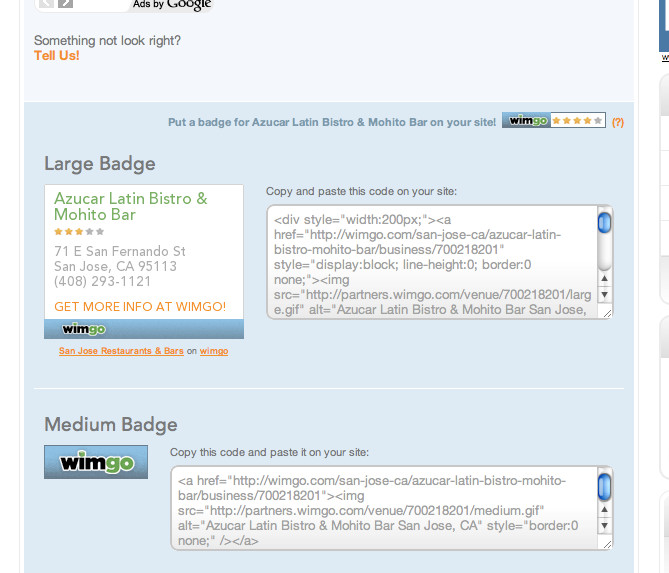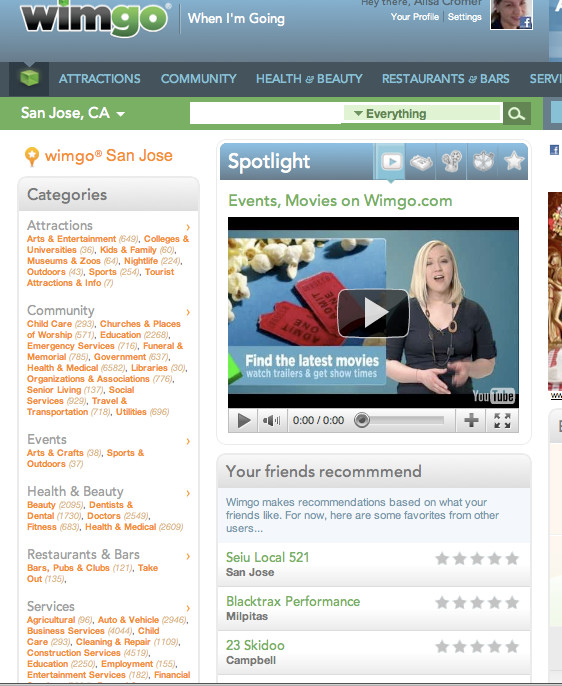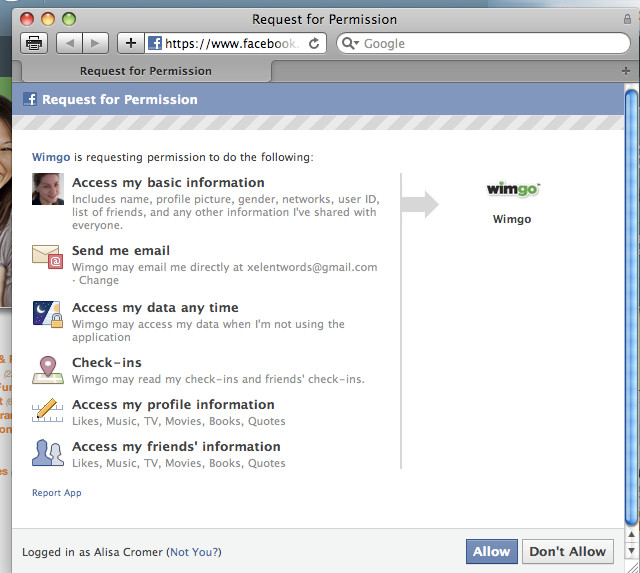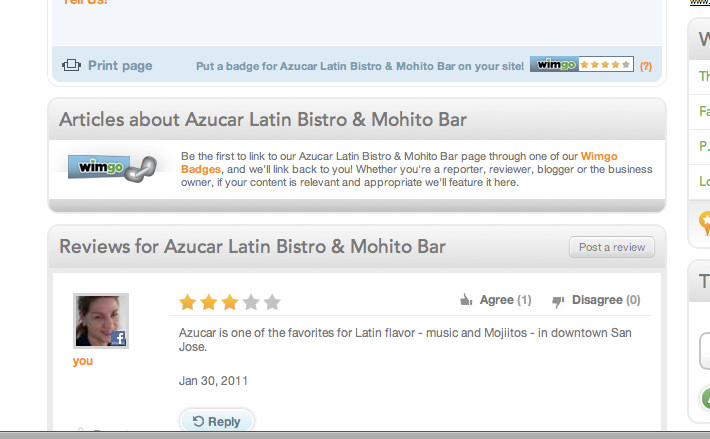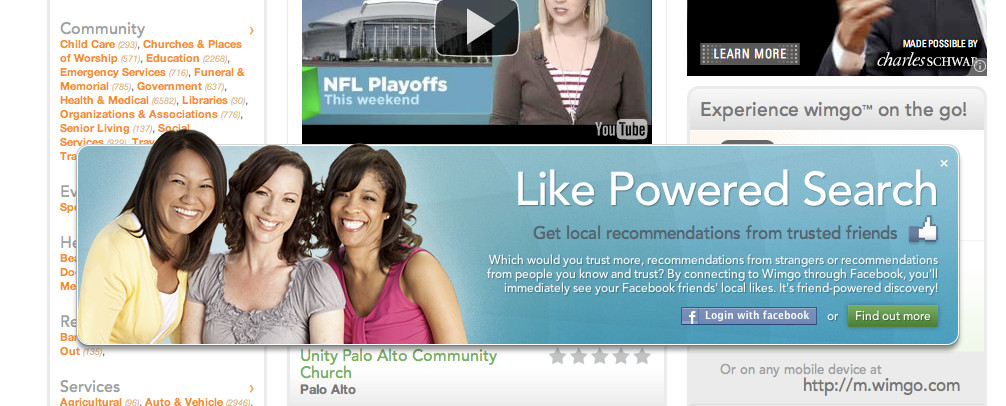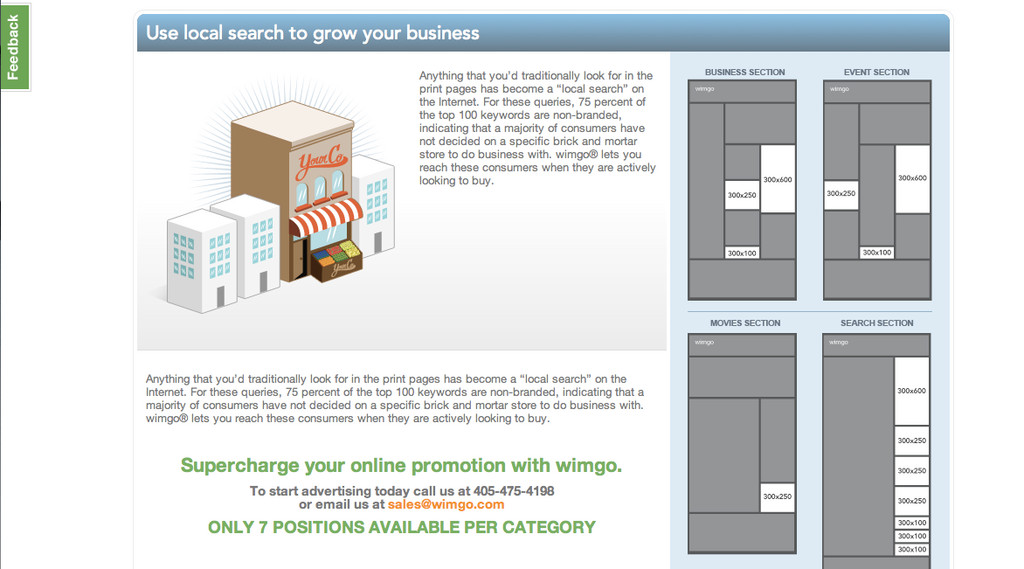Wimgo uses Facebook "likes" for directory rankings
Revenue initiative: Wimgo.com
Company: Oklahoma Publishing Company
Properties: The Oklahoman, NewsOK, Wimgo and eight other local sites, sold by its Opubco Marketing division
Key executive: Rob Wescott, Chief Technology Officer
Partnerships available: Yes
Summary
On the spectrum of directories that include user-generated content, Wimgo.com, developed by the team at the Oklahoma Publishing Company, is one of the most advanced.
Wimgo doesn’t just use Facebook instant-connect to capture user-information, it also integrates users' Facebook likes and their friends likes with business records in the directory, providing a key advantage over other recommendation sites like Yelp. That is, as long as the directory achieves critical mass in targeted categories with a forced Facebook opt-in - a concept that may or may not be ahead of its time.
Background:
Privately held Oklahoma Publishing Company has limited debt and a variety of business divisions (they include hotels, packaged goods and the largest paving stone manufacturer in Texas).
So as digital media models became more important, the company decided to launch a serious programming team to “beef up” online offerings and develop new business models. In total the company hired 40 programmers - one of the largest, if not the largest, investments in programming for a company this size in the country.
“We hired this group of talented young individuals who have a lot of great ideas and concepts. And we have a lot of people with experience and business acumen – to get those to work together can be a struggle,” Wescott says.
The two global priorities for the programmers are to “grow revenues and grow traffic.” But to flesh out the direction and drive the priorities through the company, a digital strategy team includes the Executive Vice President, Wescott as Chief Product Officer, two advertising vice presidents, the Vice President of news, the editor and Chief Technology Officer.
Challenge:
One decision the team took on was whether and how to develop in the directory space. Team members thought recommendations from friends via Facebook, integrated with a directory could get the jump on both traditional IYP’s – and Yelp. So when Facebook decided to provide an API to developers last April, one of OPCOs programers became a passionate advocate of using the API to build a platform that was fundamentally new.
“We started with the concept that you trust your friends more than strangers and we’ve just sort of been running with that completely,” Wescott says. “I challenged then to build the best Facebook integration in the world.”
Strategy:
The development team started with a concept from a URL it owned: “When I’m going.” The brand seemed too limited, however. So, after working through “when, where and why I’m going,” the team settled on Wimgo as a brand that was “undefined enough.” They kept "Where I'm going" as the site's slogan.
The new directory platform requires users to log on – and to use Facebook connect – to access business listings. When a user first finds Wimgo, a log-in window pops-up; but unlike most sites, Facebook instant connect is the only option (screen shots to the right walk you through the site, please click to enlarge).
The log-in is complete, Wimgo downloads their likes and their friends likes, connects these to the business records. So the front of the site customizes for each user and searches return friends' likes and recommendations first, followed by listings recommended by others in the area. This is critical to the model.
Like Facebook, Wimgo forces sharing – you didn’t exactly ask to see which Italian restaurant your buddy goes to – but skirts privacy issues because the likes are not shared universally on the site. And, of course, you can choose not to match the records. There is still some leeriness about how the profiles are used, but in reality, the sharing is not not nearly as underhanded as Facebook's, which broadcasts, for example, who has been out searching for more friends to their current friends, without asking.
“You are not sharing with anyone else. You are just using those to guide your experience.”
Reviewing a listing is also just a couple of clicks facilitated by a pop-up window.
It's hard to argue that this is not an improved review system. The Wimgo-style reviews fit the millennial desire to share and connect, and have the added cache of Facebook recommendations. “I don’t want to read 80 reviews from people I don’t know.”
Also, “when they leave a review (on Facebook) people tend to be more truthful and cautious because they attach their personal graph, Wescott says. Other (kinds of reviews) have a high degree of anonymity… that review could be coming from the business owners or competitors.
The site – and the records - are also visually compelling and include related Twitter feeds and company Facebook posts and pages.
The business model:
Three are three basic business models deployed on the site:
1 Businesses can claim, edit and enhance their listing with additional funcationality for $14.95 a month.
2. Additionally, when a user types in a search, the platform delivers an ad track aimed at that user. The seven positions per category are sold by the newspaper's outside sales team.
“We work to sell out those several ad positions,” and Westcott says many of tracks in key yellow page categories are sold out by OPCO’s outside sales team.
3. Finally, the site includes a Group deal product.
Results
Wescott says that revenues in Okalama City – with about 65,000 business records – are on target to reach the $600,000 to $700,000 range, and expects similar partners to achieve that level (think of the total revenue opportunity, including the Group Deal, at about $10 per business record. Or about $6 without the group deal), even after Wimgo takes its a revenue share. Anticipated revenues are split about evenly – a third a third and a third between the upsells, ad sales and group deals.
With about 5% of businesses claiming listings and about 15% of these upsold, we
estimate a little lower than that, or about $10,000 to $12,000 a month. Wescott says the advertising tracks account for about $230,000 right now. The Group Deal should have no problem generating the same amount.
Wimgo is the Oklahoma Publishing's first digital project that has been spun off into its own company. Last year it moved into a building down the street to focus on building a national footprint. The new company – which still shares key business functions with the newspaper - includes three groups of programmers: developers who write code, ones who build the user interface and others who are tasked with business development.
“We are trying to build a start-up culture where there is personal ownership of our success, direction and vision.”
The site launched nationally in September, 2010 and is now actively seeking media partners, although there are no deals are on the table as yet. Partnerships will not be private label. The revenue share will be 70% to the partner on self-serve advertising and 30% of the Group deal, with Wimgo keeping 15%. The partner keeps all its directly sold ad revenue.
Most media companies are looking for private label solutions, but many are rethinking the value of an exclusive on a national brand, especially since Groupon demonstrated the power of a national name, and because of how transient people have become.
“We feel passionately that in order to compete in the space it is the combination of our local relevance and the national footprint that will drive our economic engine,” Wescott said. "There are too many ...of us launching our own independent micro-versions of these directory-type sites and the scope of how big these get... is somewhat limited by everyone trying to build their own thing. You don't have the opportunity to brand across cities."
That may be especially important for a new model so heavily reliant on Facebook integration. However he did indicate the team may rethink its position on private-labeling based on the feedback it is receives.
Lessons learned
1. Developing requires a strong leadership group with diverse participants. “Having a clear vision of where we need to go really helps.”
2.Try to let ideas bubble up through the staff. “There are new solutions every day that we may not know of.” One technique is allowing “solutions days” where developers and programmers can work on an idea they think has an opporutnity and pitch it back to the organization.
3.“We don’t always do a good enough job of this, but I think it’s really important to celebrate a good short term win. You don’t always need to hit it out of the park.”
4. Have enough runway. “You need to be able to make mistakes, you need to be able to let things happen and that’s critical.”
5. “We need to look outside of traditional business models. I’m tired of us (media companies) being on the defensive I want to go on the offensive. I have a long carreer ahead of me and I want to start growing," Wescott says.
Our take:
Choosing Facebook for its recommendations API is way ahead of standard IYP options, which have not really worked in terms of selling more than, say 2% of listings.
An informal survey of competing marketplace launchers agree that Yellow Pages will not really be able to compete in the review site space, because IYP users and review-site users are looking for two different things. So we like Wimgo as an alternative for (even small) media companies who want to get the jump on the Millenial trend.
However Wimgo also yielded comments from experts like "A cool idea, but maybe a little ahead of its time" and "people are wary about using Facebook to log-in right away." Home services, for example, are an older demographic. Millennials (ages 19 to 32), may be more inclined to give their Facebook identity.
Rob Wescott, chief product officer started out in graphic design at an alternative weekly in Rochester, where he stayed for six years, variety of roles. He also worked for Gannet in Rochester, moving into advertising sales and business development, before taking the job at Oklahoma Publishing.

The author, Alisa Cromer is publisher of a variety of online media, including LocalMediaInsider and MediaExecsTech, developed while on a fellowship with the Reynolds Journalism Institute and which has evolved into a leading marketing company for media technology start-ups. In 2017 she founded Worldstir.com, an online magazine, to showcases perspectives from around the world on new topic each month, translated from and to the top five languages in the world.

